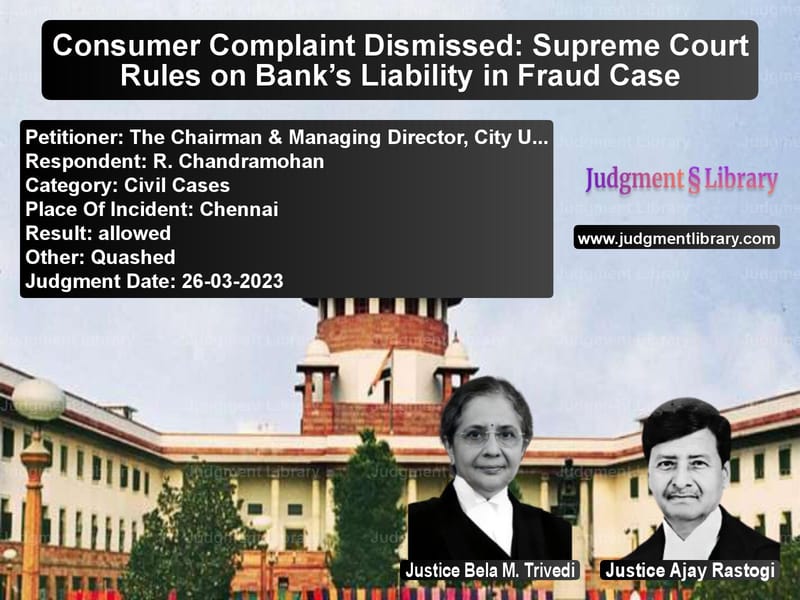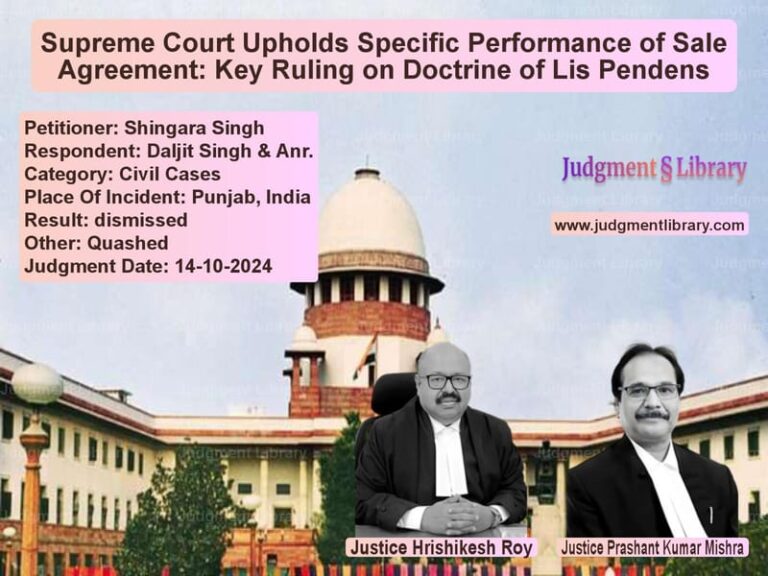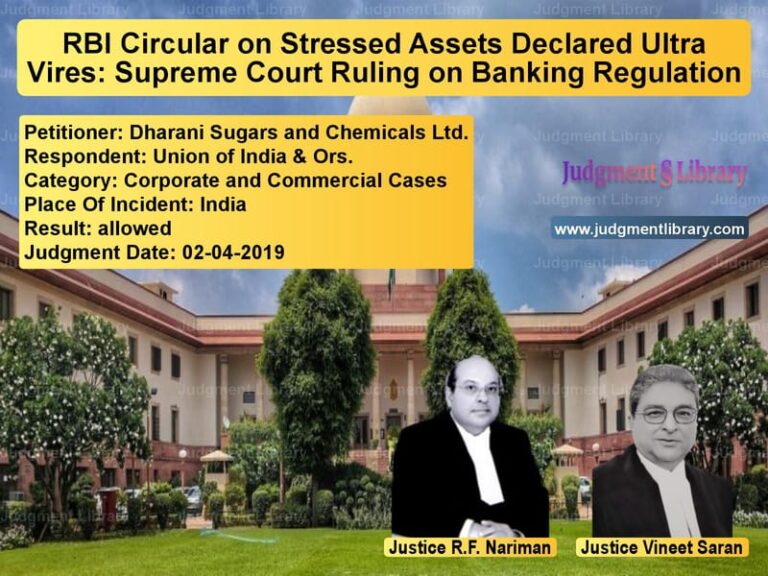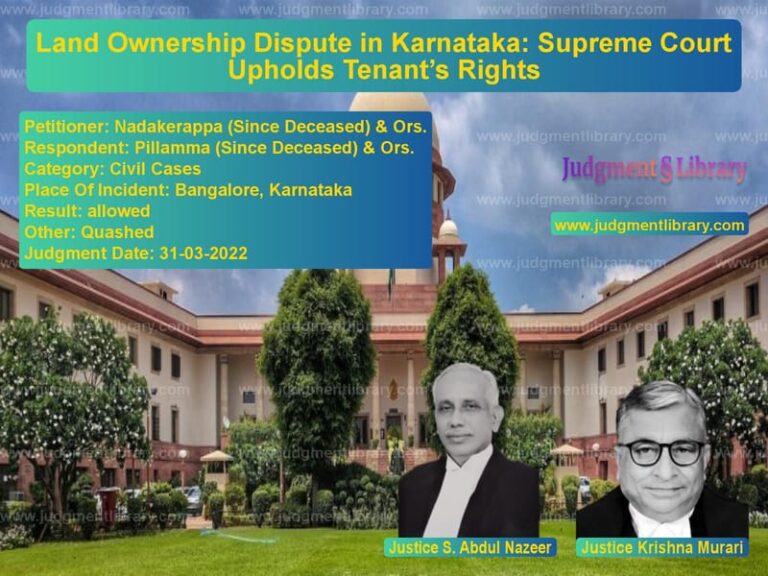Consumer Complaint Dismissed: Supreme Court Rules on Bank’s Liability in Fraud Case
The Supreme Court of India recently ruled in favor of the City Union Bank Ltd. in a dispute concerning alleged deficiency in banking services. The case revolved around the misappropriation of two demand drafts amounting to Rs. 8 lakhs and whether the bank was responsible for its mismanagement. The Court held that the proceedings under the Consumer Protection Act are summary in nature and should not be used for adjudicating complex factual disputes involving fraud.
Background of the Case
The case originated from a consumer complaint filed by R. Chandramohan, the Managing Director of “D-Cube Constructions (P) Ltd.,” against City Union Bank Ltd. Chandramohan claimed that two demand drafts of Rs. 5 lakhs and Rs. 3 lakhs, meant for his company, were wrongly credited to another account named “D-Cube Construction,” allegedly opened by another director without his consent.
The complainant contended that despite his repeated efforts, the bank failed to provide satisfactory answers regarding the missing funds. He approached the State Consumer Disputes Redressal Commission, which ruled in his favor and ordered the bank to re-credit Rs. 8 lakhs along with a compensation of Rs. 1 lakh for mental agony. The National Consumer Disputes Redressal Commission upheld this decision.
Arguments by the Appellant (City Union Bank Ltd.)
- The bank argued that there was no deficiency in service on its part under Section 2(1)(g) of the Consumer Protection Act, 1986.
- The drafts were issued in the name of “D-Cube Construction,” and a separate account was opened in that name following standard procedures.
- The account was opened with a letter of no objection from “D-Cube Constructions (P) Ltd.”
- The case involved allegations of fraud by another director, which should be adjudicated in a civil or criminal court rather than under consumer law.
Arguments by the Respondent (R. Chandramohan)
- The complainant contended that the bank’s actions facilitated fraud and mismanagement of funds.
- The bank was vicariously liable for the acts of its employees in allowing the opening of a misleadingly similar account.
- The banking principles and RBI guidelines prohibit opening accounts with similar names to avoid such confusion.
Supreme Court’s Analysis
The Supreme Court carefully examined the facts and made the following observations:
- The case involved serious disputes between the directors of the company, which pointed to fraud rather than a simple deficiency in banking services.
- The burden of proof to establish “deficiency in service” lies on the complainant, which he failed to discharge.
- Opening of an account in the name of “D-Cube Construction” was done with prior approval, and the drafts were credited accordingly.
- “Deficiency in service” must be distinguished from tortious or fraudulent acts, which should be dealt with in civil or criminal courts.
- The Consumer Commission’s proceedings are summary in nature and are not equipped to handle complex issues of fraud.
The Court referred to its previous ruling in Ravneet Singh Bagga v. KLM Royal Dutch Airlines, where it was held:
“The deficiency in service cannot be alleged without attributing fault, imperfection, shortcoming, or inadequacy in the quality, nature, and manner of performance which is required to be performed in pursuance of a contract or otherwise in relation to any service.”
Final Judgment
Based on the above findings, the Supreme Court ruled in favor of City Union Bank Ltd., stating that there was no deficiency in service under consumer law. It overturned the decisions of the State and National Consumer Commissions and dismissed the complaint.
Implications of the Judgment
This judgment reinforces the distinction between “deficiency in service” and “fraud.” It sets a precedent that consumer courts should not entertain disputes involving complex factual issues that require detailed evidence and examination, which are better suited for civil and criminal courts.
By drawing a clear line between consumer disputes and cases involving fraudulent transactions, the Supreme Court has provided much-needed clarity on the role of consumer forums and the nature of cases they should entertain.
Petitioner Name: The Chairman & Managing Director, City Union Bank Ltd..Respondent Name: R. Chandramohan.Judgment By: Justice Bela M. Trivedi, Justice Ajay Rastogi.Place Of Incident: Chennai.Judgment Date: 26-03-2023.
Don’t miss out on the full details! Download the complete judgment in PDF format below and gain valuable insights instantly!
Download Judgment: the-chairman-&-manag-vs-r.-chandramohan-supreme-court-of-india-judgment-dated-26-03-2023.pdf
Directly Download Judgment: Directly download this Judgment
See all petitions in Contract Disputes
See all petitions in Consumer Rights
See all petitions in Damages and Compensation
See all petitions in Judgment by Bela M. Trivedi
See all petitions in Judgment by Ajay Rastogi
See all petitions in allowed
See all petitions in Quashed
See all petitions in supreme court of India judgments March 2023
See all petitions in 2023 judgments
See all posts in Civil Cases Category
See all allowed petitions in Civil Cases Category
See all Dismissed petitions in Civil Cases Category
See all partially allowed petitions in Civil Cases Category







